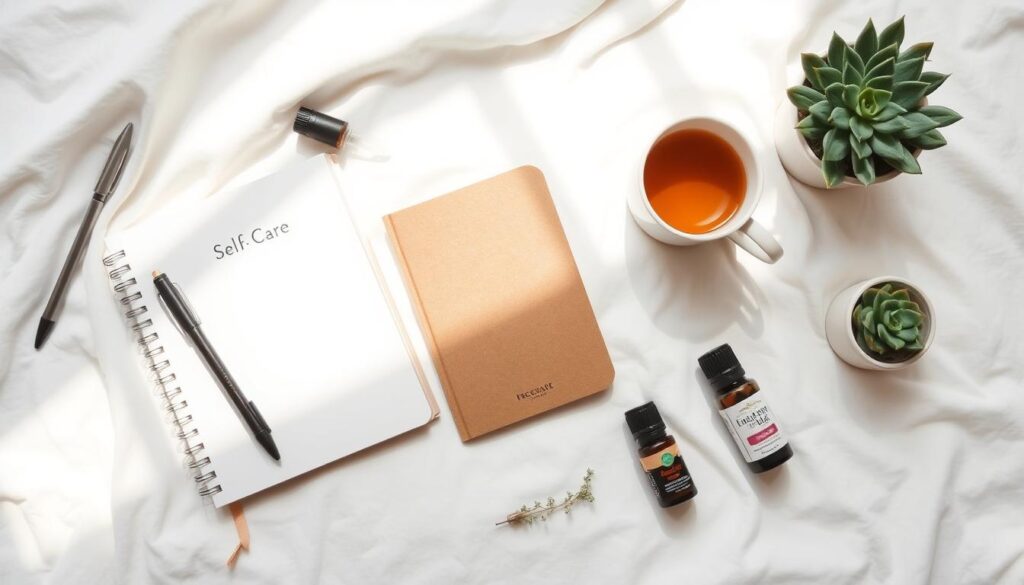Do you find it hard to care for yourself when life gets busy? You might put your own needs last, feeling stressed and tired. It’s time to make a change and find a self-care routine that fits your life.
This post contains affiliate links. If you purchase through these links, I may earn a small commission at no extra cost to you. Learn more here.
Self-care is key for keeping you healthy in body, mind, and spirit. By adding daily routines and wellness practices, you can handle stress better. You’ll also improve your balance between work and life. But how do you create a self-care plan that’s just right for you?
In this article, we’ll show you how to figure out what you need for self-care. We’ll help you set goals and make a plan that fits your life. Whether you’re busy with work, school, or family, we have tips for making self-care a part of your day. Get ready to learn how to take care of yourself and live your best life.
Embarking on a self-care routine is a powerful step toward holistic well-being. To support and inspire you along the way, consider integrating audiobooks into your daily life. Audible offers a vast selection of titles that can provide guidance, motivation, and relaxation—perfect companions for your self-care practices.
With Audible’s 30-day free trial, you can:
-
Select any audiobook from their extensive collection to keep.
-
Enjoy unlimited listening to thousands of titles, including Audible Originals and podcasts.
-
Experience flexibility, as you can cancel anytime before the trial ends without any charges.
After the trial, membership continues at $7.95/month, but you can cancel online anytime.
For those seeking inspiration, consider starting with:
-
Atomic Habits by James Clear: Discover practical strategies to build good habits and break bad ones.
-
The 5 AM Club by Robin Sharma: Learn about the transformative power of early rising and how it can elevate your life.
➡️ Try Audible Free for 30 Days and enrich your self-care routine with insightful listening.
Key Takeaways
- Understand the importance of self-care for your overall well-being
- Assess your current self-care needs and identify areas for improvement
- Set realistic and achievable self-care goals tailored to your lifestyle
- Develop a personalized self-care plan with daily, weekly, and monthly practices
- Integrate self-care seamlessly into your existing routines and schedule
- Overcome common barriers to self-care, such as time constraints and guilt
- Regularly evaluate and adapt your self-care routine as your needs change over time
The Importance of Self-Care
In today’s fast world, it’s easy to forget about ourselves. But, it’s key to make time for self-care activities. This helps keep us physically, mentally, and emotionally healthy. By focusing on self-care, we can live happier and healthier lives.
Understanding the Benefits of Self-Care
Regular self-care can change our lives for the better. It helps us deal with stress and build strong bonds. It also helps us grow personally. The main benefits include:
- Less stress and anxiety
- Better mood and happiness
- More self-awareness and self-esteem
- Being stronger when faced with challenges
- Deeper, more meaningful relationships
Adding mindfulness techniques to self-care boosts these benefits. Mindfulness, like meditation, keeps us grounded. It brings calm and clarity to our lives.
The Consequences of Neglecting Self-Care
Ignoring our needs can lead to burnout. It affects our body, mind, and spirit. The negative effects include:
- More anxiety and depression
- Chronic stress and tiredness
- A weaker immune system and getting sick easier
- Strained relationships and feeling alone
- Less productivity and motivation
Not taking care of ourselves harms our well-being. It also makes it hard to be there for others. Self-care is key to breaking this cycle and living a more balanced life.
Assessing Your Self-Care Needs
To build a self-care routine, look closely at your lifestyle and habits. Check your physical health, mental health, social needs, and spiritual needs. Find out where you’re stressed and neglecting yourself. Then, make a plan that fits your needs for wellness.

Start by thinking about your daily life. Do you sleep well, eat right, and move often? These basics are key for health and strength. Next, think about your feelings and mind. Do you handle stress well, or do you turn to bad habits like eating too much or watching too much TV?
Your social needs are also important. Good friends and family help you feel connected and supported. Think about your relationships and where you might need to make changes.
Identifying Areas of Stress and Neglect
Keep a journal for a few weeks to find stress and neglect. Write down what you do, how you feel, and your energy. This can show you patterns and what’s making you tired or stressed. Also, ask people you trust for their honest thoughts on your self-care.
Evaluating Your Current Lifestyle and Habits
Use self-assessment tools to check your lifestyle and habits. These include:
- Wellness assessments that explore various dimensions of health and well-being
- Stress inventories that measure your stress levels and coping strategies
- Personality tests that provide insights into your strengths, weaknesses, and communication styles
- Values assessments that help you clarify your priorities and align your actions with your core beliefs
By deeply understanding your self-care needs, you can make a self-care plan that really helps you. This plan will support your journey to better health, happiness, and fulfillment.
Setting Realistic Self-Care Goals
Starting your self-care journey means setting goals that fit your life and limits. Clear goals help you stay on track and keep you motivated.

Creating SMART Goals for Your Self-Care Routine
Make sure your self-care goals are SMART:
- Specific: Know exactly what you want to achieve
- Measurable: Find ways to measure your progress
- Achievable: Choose goals that are hard but possible
- Relevant: Make sure your goals help your well-being
- Time-bound: Set deadlines to stay on track
Using the SMART method helps you organize your self-care. It makes it easier to keep up and celebrate your wins.
Prioritizing Your Self-Care Needs
When setting goals, focus on what’s most important for your well-being. Think about both quick fixes and long-term changes.
Ask yourself these questions to prioritize:
- What’s causing me the most stress or neglect?
- What self-care can have the biggest positive effect on my health?
- How can I balance self-care with my duties and commitments?
Your self-care path is yours alone. Be flexible and adjust as needed. Don’t hesitate to change your priorities if your life does.
Developing a Personalized Self-Care Plan
Creating a self-care plan that fits you is key for lasting success. By adding daily practices and extensive self-care activities, you can care for your well-being fully.

Begin by picking small self-care steps you can add to your existing routines. This could be taking a few minutes each morning to breathe deeply, eating a healthy breakfast, or doing a hobby you love. It’s important to pick things you can do every day.
Planning Weekly and Monthly Self-Care Practices
Also, plan bigger self-care activities for weekly or monthly. These could be:
- Going to a yoga or meditation class
- Getting a massage or spa treatment
- Going for a nature hike or spending time outside
- Doing something creative like painting or writing
By mixing daily and bigger self-care, you make a plan that really helps your well-being.
Building Flexibility into Your Self-Care Routine
Life can change fast, so make your self-care flexible. It’s okay to change your plan or miss a day sometimes. Self-care is about being kind to yourself.
To stay on track, use tools and resources like:
- Journaling apps to track your progress
- Meditation or mindfulness apps for guided sessions
- Online groups for support and accountability
Remember, making a self-care plan is a journey. Keep checking and changing your routine to keep it working for you.
How to Build a Self Care Routine That Fits Your Lifestyle
Creating a self-care plan that fits your life is key to feeling good long-term. Tailor your self-care to your needs and life. This way, you can grow and stay strong.

To make a self-care routine that’s just for you, first look at your habits. See where you might be ignoring your well-being. Think about your job, family, and what you like when figuring out what you need.
After knowing what you need, set goals that fit your life. Break these goals into small steps for each day, week, and month. Make sure these steps fit easily into your daily life. Also, remember to be flexible for when things change or get tough.
“Self-care is not a luxury, it’s a necessity. It’s the foundation upon which we build our lives.” – Unknown
When you start your self-care plan, watch out for things like not enough time, too many tasks, and doubting yourself. Make self-care a must-do part of your day. Ask for help from people you trust when you need it.
Keep checking if your self-care is working for you. Change it if you need to, so it keeps up with your life. By being open and adaptable with self-care, you can live a happy and healthy life.
Integrating Self-Care into Your Daily Life
Adding self-care to your daily routine is key for a healthy life. Make self-care a must-do part of your day. This way, you always put your well-being first.

One great way to add self-care is to treat it like any other important task. Set times for self-care and keep those appointments. This shows you and others that your health is important.
Making Self-Care a Non-Negotiable Part of Your Schedule
First, pick the self-care activities you love most. These could be exercise, meditation, or reading. Then, mark these times in your calendar and keep them special.
If you’re short on time, wake up a bit earlier or use your lunch break. Even a little self-care can greatly improve your mood.
Finding Opportunities for Self-Care in Existing Routines
Find ways to add self-care to your daily tasks. For example, breathe deeply while you commute or listen to a podcast while you clean. This makes self-care easy and fun.
Linking self-care to daily tasks helps you stick to it. You’ll also feel calm and happy while doing these activities.
Remember, making self-care a part of your life takes time and effort. But with good time management and a focus on your well-being, you can do it. Start by making self-care a must and find ways to fit it into your day.
Overcoming Barriers to Self-Care
Starting a self-care routine can be tough. Many things can get in the way, like not having enough time or feeling unmotivated. But, you can find ways to make self-care work for you.

Addressing Time Constraints and Competing Priorities
Not having enough time is a big problem. With so much to do, it’s hard to find time for yourself. Here are some tips to help:
- Make self-care a priority by putting it in your schedule.
- Do small self-care things during the day, like a quick meditation or stretch.
- Try to do more than one thing at once, like listening to a podcast while doing chores.
Dealing with Guilt and Self-Doubt
Many people feel guilty about taking care of themselves. They might think it’s selfish or doubt if they deserve it. But, self-care is essential for your well-being.
Being kind to yourself is important. Everyone needs to take care of their health. Find people who support your self-care and get help if you need it.
Managing Financial Limitations
Money can also be a problem for self-care. Some things might seem too expensive. But, there are affordable options:
- Use free resources like online yoga or meditation apps.
- Find fun self-care activities at home, like a relaxing bath or journaling.
- Look for discounts on self-care services that fit your budget.
Creating a self-care routine that works for you is key. By facing challenges and finding solutions, you can build a strong self-care practice. This will help you through life’s ups and downs.
Maintaining Motivation and Consistency
Keeping up with self-care is key for lasting benefits. Set goals that fit your values and what’s important to you. Celebrate every small win to keep your spirits high.
Adding variety to your self-care keeps things fresh. Try new things like yoga, reading, or a relaxing bath. This keeps your self-care exciting and fun.
Having support from friends or a self-care group helps a lot. Share your goals and how you’re doing with people you trust. They can cheer you on and offer advice.
Tracking your self-care helps you stay on track. Use a journal or app to log your self-care moments. Seeing your progress can motivate you to keep going.
Building a strong self-care routine takes time and kindness to yourself. Enjoy the journey, learn from mistakes, and celebrate your achievements. With dedication, you’ll have a self-care routine that makes you feel great.
Adapting Your Self-Care Routine Over Time
Starting your self-care journey is exciting. But remember, your needs and life can change. It’s key to check if your self-care is working for you.
Regularly Evaluating the Effectiveness of Your Self-Care Practices
Check how your self-care is doing often. This helps you see if it’s really helping you. Look at your mental, physical, and emotional health. Also, check how you handle stress and your work-life balance.
- Mental and emotional well-being
- Physical health and energy levels
- Stress management and resilience
- Work-life balance and relationships

Keeping track of your self-care can show you what works. Use a journal, app, or spreadsheet. This way, you can see patterns and make better choices for your self-care.
Adjusting Your Routine to Accommodate Changing Needs and Circumstances
Your life changes, so should your self-care. Evolving self-care needs can come from new jobs, becoming a parent, or moving. These changes might mean you need to adjust your self-care.
| Life Change | Potential Self-Care Adjustment |
|---|---|
| Starting a new job | Incorporate stress-management techniques |
| Becoming a parent | Prioritize sleep and seek support |
| Moving to a new city | Explore new self-care activities and social connections |
Be flexible and ready to change your self-care as needed. Ask for self-care feedback from people you trust. Remember, dynamic self-care means being open to change and caring for yourself.
Self-care is not a one-size-fits-all endeavor. It’s a dynamic, personal journey that evolves with you.
Conclusion
Creating a self-care routine that fits your life is a journey. It needs dedication and thinking about what you need. By setting goals that are realistic, you can make a plan that helps you feel whole.
Adding self-care to your daily life can be hard. But, by facing challenges and staying motivated, you can keep it up. This makes self-care a lasting part of your life.
Your self-care journey is always changing. It’s important to check if what you’re doing is working. Being open to change helps your self-care stay effective and good for you.
As you go on your self-care journey, celebrate your wins. See how it makes your life better. With a self-care plan that fits you, you can live a healthy and happy life.


